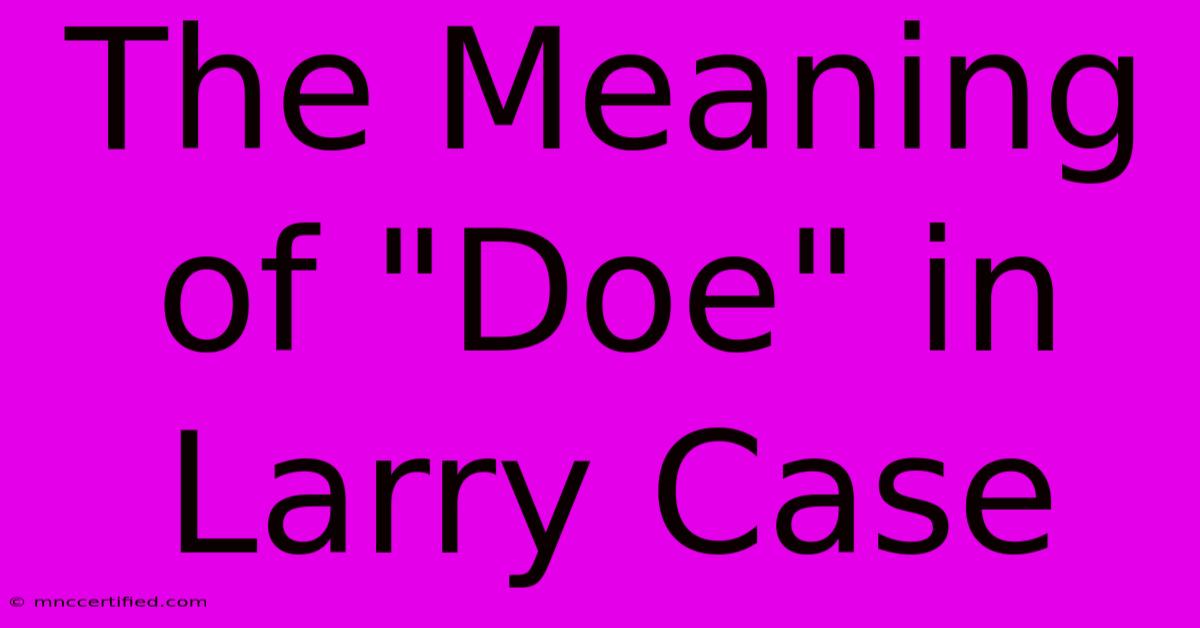The Meaning Of "Doe" In Larry Case

Table of Contents
The Meaning of "Doe" in the Larry Case: Unraveling the Mystery
The Larry case, a widely discussed example in legal and ethical discussions, often features the pseudonym "Doe." But what does this seemingly simple term actually mean in the context of this complex situation? Understanding its significance requires delving into the legal and privacy implications surrounding the case. This article will explore the meaning and implications of "Doe" in the Larry case, clarifying its role and significance within the broader legal framework.
Why "Doe" is Used: Protecting Identities
The use of "Doe" – and similar pseudonyms like "Roe" – is a common practice in legal proceedings, particularly when dealing with sensitive cases involving minors, victims of sexual assault, or individuals whose identities need protection. In the Larry case, the pseudonym likely serves to:
-
Protect the privacy of individuals involved: The case may contain details about vulnerable individuals. Using "Doe" shields their identities from public scrutiny, safeguarding their privacy and protecting them from potential harassment or negative consequences. This is especially important given the sensitive nature of many cases using this anonymization technique.
-
Prevent prejudice and bias: Public knowledge of the identities involved could introduce bias into the legal process. Using pseudonyms ensures a fairer trial by preventing preconceived notions from influencing the outcome. The judge may choose to employ such measures to ensure impartiality.
-
Comply with legal requirements: In many jurisdictions, there are legal provisions that protect the identities of minors or individuals involved in sensitive cases. The use of "Doe" might be a legal requirement to comply with these protective measures.
The Implications of Anonymity: Balancing Interests
While using pseudonyms like "Doe" is crucial for protecting individual privacy, it also presents challenges:
-
Transparency and public accountability: Anonymity can sometimes limit public oversight of legal proceedings. It raises concerns about transparency and whether the process is fully accountable to the public.
-
Difficulties in verifying information: It can be challenging to verify the accuracy of information when dealing with anonymized individuals. This can make it difficult to fact-check or ensure that the information presented is accurate and unbiased.
-
Potential for misuse: In some instances, the use of "Doe" might be misused to shield individuals from rightful accountability. This necessitates a cautious approach and a careful balancing of the need for privacy and the need for public scrutiny.
Beyond the Larry Case: A Broader Legal Context
The use of "Doe" is not unique to the Larry case. It's a standard practice across various legal domains, including:
-
Child custody cases: Protecting the identity of the child is paramount.
-
Sexual assault cases: Victims often require anonymity to prevent further trauma and potential retaliation.
-
Cases involving domestic violence: Protecting the victim's identity is crucial to their safety and well-being.
Conclusion: Navigating the Complexities of Anonymity
The use of "Doe" in the Larry case highlights the delicate balance between protecting individual privacy and ensuring transparency in legal proceedings. While anonymity serves vital purposes, its implications must be carefully considered to prevent potential misuse and ensure a just and fair legal system. Understanding the rationale behind this common legal practice is crucial for navigating the complexities of such sensitive cases and recognizing the importance of protecting vulnerable individuals while maintaining accountability. The ongoing debate surrounding the use of pseudonyms in legal contexts reflects the importance of this crucial consideration.

Thank you for visiting our website wich cover about The Meaning Of "Doe" In Larry Case. We hope the information provided has been useful to you. Feel free to contact us if you have any questions or need further assistance. See you next time and dont miss to bookmark.
Featured Posts
-
Resentencing Menendez Brothers Case
Nov 26, 2024
-
Cold Case Director On Ramsey Murder
Nov 26, 2024
-
Nfl Chargers Sign Apple Activate Leonard
Nov 26, 2024
-
Shelter Insurance Charleston Ar
Nov 26, 2024
-
Direct Mail Leads For Insurance
Nov 26, 2024